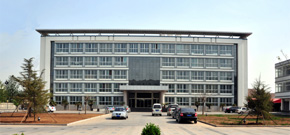1. introduction to Henan Feitian agricultural development Limited by Share Ltd
Henan Feitian Agricultural Development Co., Ltd. is located in Tiexi Industrial Park, Qixian County, Henan Province. It is a joint-stock enterprise established by the former Henan Yongchang Feitian Starch Sugar Co., Ltd. in September 2012. The registered capital of the company is 120 million yuan. It is a large-scale enterprise which integrates grain storage and intensive processing, starch and starch sugar production and sales, product research and development, thermal production and supply. It has annual production capacity of 500 thousand tons of corn and annual processing capacity of 240 thousand tons of wheat.
The company has been awarded several honorary titles, such as national key leading enterprises in agricultural industrialization, key enterprises with state financial participation, top 20 enterprises in China's starch sugar industry, national high-tech enterprises, etc. The R&D center of the enterprise has been appraised as Henan Enterprise Technology Center, and participated in drafting and formulating the Guidelines for the Classification of Starch Sugar Products, etc. The domestic standard has won 28 national patents successively, and is one of the leading enterprises of grain deep processing in Henan province.
The company's products are exported to more than 20 countries and regions, including South Korea, Australia, Russia, Turkey, Brazil, Chile, etc. The area is well received by users.
2. utilization of leftovers from Henan starch sugar industry
The starch industry, which uses corn and wheat to produce glucose, maltose and fructose syrup, also produces corn husk and bran, sugar residue, corn protein and corn syrup and other by-products, as well as sewage sludge and other waste residues. These by-products have been difficult to effectively utilize. Our research team conducted a survey of large starch sugar enterprises in Henan Province. The by-products were treated in the following ways: (1) low-priced feed sold to breeding enterprises or farmers; (2) low-priced raw materials sold to other companies to reproduce other products; (3) mixed with vitamin minerals and other raw materials as feed. Selling materials; (4) Sludge and other wastes are supplied to fertilizer producers or farmers for free, and sometimes even to these enterprises or farmers for certain treatment of waste subsidies. The above way of processing starch sugar leftovers, starch sugar enterprises have little benefit. The inefficient utilization of starch sugar waste material is not only the present situation of starch sugar production enterprises in Henan Province, but also the common problem of the domestic industry.
3. production and treatment of starch sugar leftovers from our company
In 2017, the company's corn and wheat processing starch sugar produced by-products and waste residues and their output are as follows: 109 tons of ordinary corn husk, 44763 tons of sprayed corn husk, 2169 tons of corn gluten meal, 12295 tons of wheat bran, sugar residue 4041 tons, 213 tons of corn syrup, 180000 tons of alcohol mash, 30 000 tons of sludge; In addition, the use of farm waste; Biogas production produces about 40 tons of biogas residue per year. Corn fiber, corn gluten meal, sugar residue, wheat bran and other by-products were sold at low prices, corn syrup, alcohol mash, sludge and biogas residue free to small enterprises or farmers. The annual revenue generated from starch sugar processing is about $110 million.
4. implementation plan of this project
With the proposal of "ecological civilization construction" at the 18th National Congress of the CPC, China's environmental protection has been strengthened day by day, and the demand for cleaner production has become higher and higher. How to make the starch sugar industry these precious "waste materials" resource utilization, not only to improve the added value of products, waste into treasure, but also to minimize the pollution of waste water and waste residue to the environment, this is a comprehensive technical system engineering. In view of the low utilization rate of the "three wastes" produced by our company, we have formed a joint research team with Henan University of Technology and Zhengzhou Golden Lily Bioengineering Co., Ltd. Based on the current basic process, we have invested a small amount of money to add some key necessary equipment, according to the nutrient composition of the waste liquid and residue and Features: Selection of highly effective microbial strains, the use of micro-ecological solid-liquid fermentation technology, combined with market demand, the production of high-quality and efficient livestock feed additives and agriculture urgently needed to improve the soil, replace some pesticides and chemical fertilizers of biological fertilizers and soil remediation agents. This project plans to develop and produce the following 4 kinds of products.
(1) Probiotic feed additives: corn fiber, wheat bran, corn protein powder, sugar residue, corn syrup, distiller's grains and other agricultural and sideline products are dried after solid fermentation by probiotics to produce high-activity biological feed additives;
(2) Animal feed: corn fiber, wheat bran, corn protein meal, sugar residue, corn syrup, distiller's grains, and then purchased to add a part of other products, after the probiotic solid anaerobic fermentation, do not dry, directly to chicken farms, pig farms to feed farmed animals.
This product does not go through the drying process, which not only reduces the energy input, but also maximizes the number of live bacteria and flavor of the product, making the product quality better.
(3) Liquid fermented products: corn syrup with other raw materials, fermented by probiotics to replace drinking water or as a biological disinfectant, used in chicken farms for disease prevention and treatment, improve the environment.
Fermented wet fodder and liquid fermented products can be sold to farmers in and around Hebi. The breeding industry in Hebi and its vicinity is developed, which can make full use of this geographical advantage.
(4) The sludge and biogas residue which can not be used in animal husbandry and other by-products which are not suitable for the production of fermented feed are mixed with some agricultural wastes such as crop straw, and then other raw materials (such as sodium humate) are fermented by probiotics to produce Biofertilizers urgently needed for agriculture.
5. economic benefits
According to preliminary estimates, according to the company's by-product output, every year can produce a variety of probiotic fermented feed and biofertilizer about 300,000 tons, sales revenue of about 1.56 billion yuan. After deducting the current sales revenue of by-products of 110 million yuan, the cost of other raw materials is about 150 million yuan, as well as the input of production, labor, sales expenses, management costs, taxes and so on, it is estimated that the net profit will be increased by about 300 million yuan annually, with considerable economic benefits.
6. social benefits
The implementation of this project can provide 30-50 jobs for the surrounding migrant workers, and the products can provide farmers and farmers with a radius of less than 100 kilometers with good quality and low price products, and can greatly improve and improve the quality of agricultural and sideline products, and increase agricultural efficiency and income for farmers.
Starch sugar production enterprises in Henan Province have not yet effectively solved the problem of clean production of by-products and waste residues. The implementation of this project not only has considerable economic benefits, but also provides an effective solution for the utilization of waste materials in the same industry in Henan Province, which can be used as a reference for the development of starch sugar industry in Henan Province. Leading role.
7. ecological benefits
It solves the problem of three wastes pollution in starch sugar production which has puzzled our enterprise for many years. It roughly estimates that thousands of tons of wastewater discharged from COD and BOD exceeding the standard will be reduced every year. It protects the ecological environment of blue sky and green water, reduces residents'complaints and opens up a new road for cleaner production and sustainable development of the enterprise.









